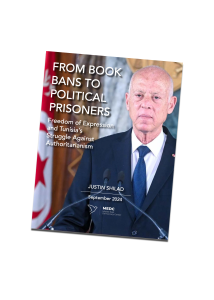 On July 25, 2021, Tunisian President Kais Saied seized extensive powers for himself and started a sweeping crackdown on dissent that continues to this day. Saied has since systematically eliminated or neutralized institutions that could check his power and his government has arrested or harassed scores of activists, artists, journalists, lawyers, and opposition politicians. Meanwhile, Saied and his allies, both inside and outside of the government, have ratcheted up a demagogic campaign against migrants, black Tunisians, and other marginalized communities. The result is a wide-ranging campaign that is not only undoing Tunisia’s gains in free expression since the 2011 revolution, but also attacking Tunisia’s heterogenous cultural and social life in the name of defending national identity.
On July 25, 2021, Tunisian President Kais Saied seized extensive powers for himself and started a sweeping crackdown on dissent that continues to this day. Saied has since systematically eliminated or neutralized institutions that could check his power and his government has arrested or harassed scores of activists, artists, journalists, lawyers, and opposition politicians. Meanwhile, Saied and his allies, both inside and outside of the government, have ratcheted up a demagogic campaign against migrants, black Tunisians, and other marginalized communities. The result is a wide-ranging campaign that is not only undoing Tunisia’s gains in free expression since the 2011 revolution, but also attacking Tunisia’s heterogenous cultural and social life in the name of defending national identity.
A new MEDC report, “From Book Bans to Political Prisoners: Freedom of Expression and Tunisia’s Struggle Against Authoritarianism,” details how the crackdown was enabled in part by weak institutions, political paralysis, and far reaching legislation such as the anti-terrorism bill of 2015 that pitted free expression against national security in public discourse — all factors which Saied was able to take advantage of in uprooting Tunisia’s nascent democracy and rolling back the hard earned rights of Tunisians since the revolution.
Reversing the current trends on free expression requires robust pushback from Tunisia’s diverse civil society; it also requires the international community to support democratic institution building, prioritize free expression, and stand in solidarity with Tunisia’s civil society and cultural communities.
“Policymakers and those who stand for human rights worldwide should note that free expression is not only a critical front against authoritarianism in Tunisia, but also the foundation for a return to democracy, and should support those in Tunisia engaged in that fight accordingly,” writes Justin Shilad.
Read the full report here.
Justin Shilad is a human rights advocate and researcher. His work has focused on the intersection of free expression and broader human rights issues, the impact of U.S. foreign policy on press freedom, accountability for attacks against journalists, and assistance for displaced journalists and writers, among other issues.
Photo Credit: Tunisian Presidency/Facebook



|
Consolidating Power: Tunisian President Kais Saied’s Crackdown on the Judiciary